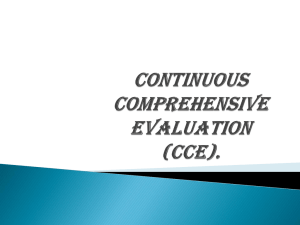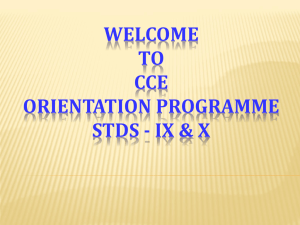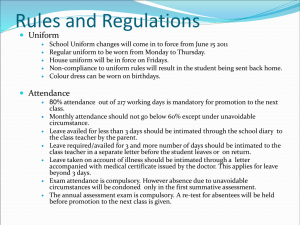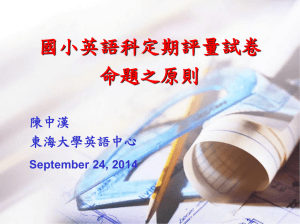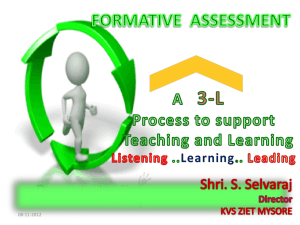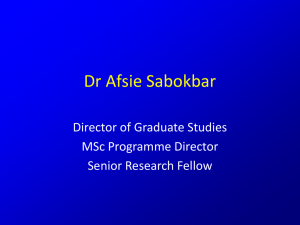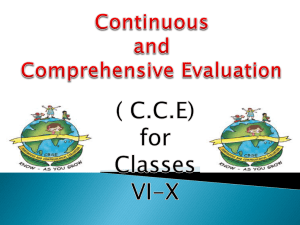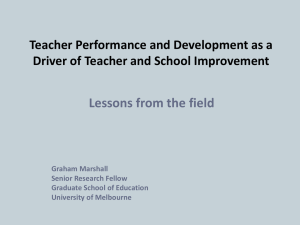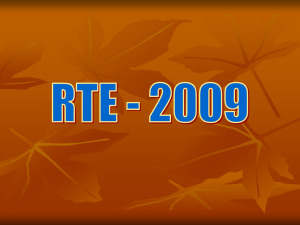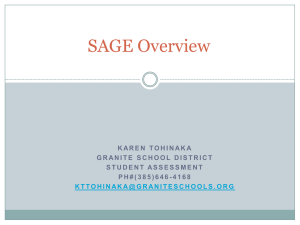Welcome To CCE Orientation Programme
advertisement
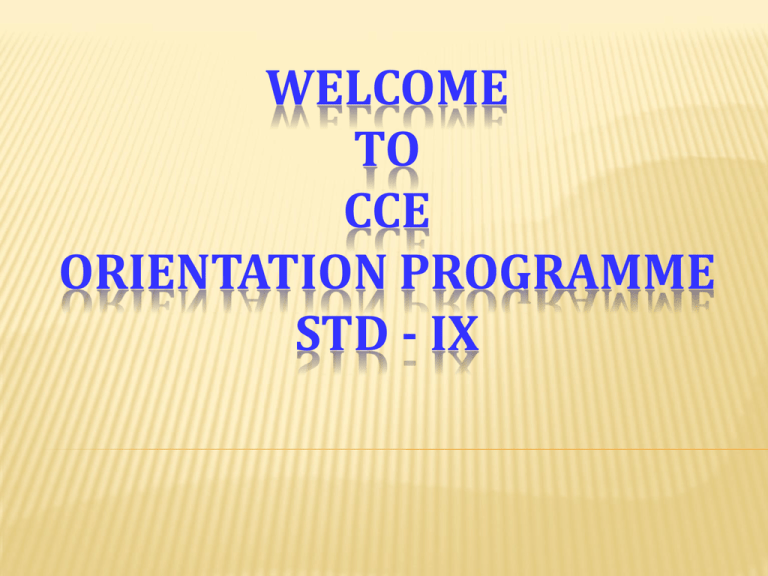
WELCOME TO CCE ORIENTATION PROGRAMME STD - IX WHAT IS ‘CONTINUOUS’ AND ‘COMPREHENSIVE’ EVALUATION Continuous and Comprehensive Evaluation (CCE)refers to a system of school-based evaluation of students that covers all aspects of students development. OBJECTIVES OF CCE • • • • • • • To help develop cognitive, psychomotor and affective skills. To lay emphasis on thought process and de-emphasise memorization To make evaluation an integral part of teaching-learning process To use evaluation for improvement of students achievement and teaching – learning strategies on the basis of regular diagnosis followed by remedial instruction To use evaluation as a quality control devise to maintain desired standard of performance To determine social utility, desirability or effectiveness of a programme and take appropriate decisions about the learner, the process of learning and the learning environment To make the process of teaching and learning a learner-centered activity. (CCE) Scholastic Assessment Co-Scholastic Assessment Duration of the term I - Term June - September II – Term October - March SCHOLASTIC ASSESSMENT (PART-1 A) Formative Assessment Summative Assessment FORMATIVE ASSESSMENT Assessment which is carried throughout the year by the teacher formally and informally FORMATIVE ASSESSMENT (FA) Will comprise of : • Class work • Homework • Oral questions • Quizzes • Projects • Assignments/Tests • Unit Test FORMATIVE ASSESSMENT TOOLS SUBJECT WISE ACTIVITIES FOR FORMATIVE ASSESSMENT - SCIENCE Science talk Pick & speak Experimental work Group work Quiz Class response Model making PPT Lab activity Collecting pictures relevant to the topic Drawing of the diagram Mind mapping Scrap book activity Role play Chart making Collage making Compare & contrast UNIT TEST ACTIVITIES FOR FORMATIVE ASSESSMENT - ENGLISH / II LANGUAGE Listening comprehension Conversation Dialogue writing / oral Debate Oration Recitation PPT Quiz Grammar Practice with Picture Pick & speak Paragraph writing with relevant pictures Story telling / writing Reading test Class magazine Missing Letters / Proposition MCQ Collage Role play UNIT TEST ACTIVITIES FOR FORMATIVE ASSESSMENT - SOCIAL STUDIES Compare & contrast Model making Role play / skit Open book test Peer teaching Collecting pictures related to the topic PPT Field trip – report Seminar Quiz Map work Map recognition Collage work Mock parliament UNIT TEST ACTIVITIES FOR FORMATIVE ASSESSMENT - MATHS Lab activity / Lab Record Paper cutting & pasting Domino cards for basic operation Quiz Buying & selling – class activity Peg board Prime & composite - Beads MCQ Model making PPT Collage Class work Home work Mental ability Class response Peer teaching Peer assignment Mind mapping UNIT TEST SUMMATIVE ASSESSMENT It is basically the pen to paper test conducted at end of each term Term I September Term II March Summative assessment is carried out at the end of a course of learning. It measures or 'sums-up' how much a student has learned from the course. It is usually a graded test, i.e., it is marked according to a scale or set of grades ASSESSMENT BY CCE TERM 1 FA-1 + FA-2 + SA 1 = 10+10 + 30 = 50 TERM 2 FA-3 + FA-4 + SA 2 = 10+10 + 30 = 50 100 MANDATORY APPEARANCE AND QUALIFYING MARKS Mandatory for a student to appear in both the SAs in both classes IX and X Score a minimum of 25% in SA taken together to qualify for the examination. EIOP will be conducted by the board in July. SCHOLASTIC - A SUBJECTS • Hindi •English •Social Science •Science •Mathematics •Add. Subject FORMATIVE Observation SKILLS Analysis Problem Solving Use of I.T. Correlation to real life Comprehension Expression Creativity Data Handling Oral Listening, Writing ADDITIONAL SUBJECTS • Foundation of Information Technology •Home Science •Painting •Music •Others SUMMATIVE Questions Conversation Examination Project Short Answer Essay Very Short Answer Elocution Question Test TOOLS & TECHNIQUES Essay MCQ Data Interpretation CO-SCHOLASTIC AREAS Social skills Life skills Thinking skills Emotional skills Values & Attitudes Clubs Literary &Creative skills Aesthetic skills & Performing art Health & Physical education assessment in all co-scholastic areas activities is to be done on 5 point scale. maximum grade points a student can obtain in co-scholastic areas activities is 65 • • • • • • Students who get total grade points in the range 53-65 may get upgraded to the next higher grade in two subjects. Students who get total grade points in the range 40-52, may get upgraded to the next higher grade in one subject. No Grade will be up scaled twice. No up scaling is done if Grade is E2 or A1. Up scaling done from lowest grade to next higher grade. Upgraded grade is shown with “**”. METHODS OF ASSESSMENT 1. 2. 3. 4. Observation Assignment Projects Portfolio 6. Checklist Rating scale 7. Anecdotal records 5. Narrative records Photographs/ Videos Conversation Skills Self Assessment Assignments Checklist Questions Portfolio Essays Assessment Tools & Techniques Observation Projects Quizzes Rating Scales Oral Questions Research Work (group) Peer Assessment Paintings/ Artistic Endeavour Narrative Reports Observation ASSESSMENT OF SPEAKING & LISTENING Purpose To improve and standardize students’ communicative skills. FORMAT consists of task types for both listening and speaking activities • LISTENING – – – – • objective type. each question will be of one mark each. Awarding of half mark is to be avoided. If there are more than four or five spelling mistakes then up to two marks may be deducted out of the total marks. SPEAKING The students are assessed on – – – – Interactive competence Fluency and coherence Pronunciation Language with reference to accuracy & range OPEN BOOK ASSESSMENT • • • • • • • • applicable to all the main subjects. part of Summative Assessment II CBSE supplies textual material few months before the commencement of Summative Assessment II. textual material may be in the form of an article, a case study, a diagram, a concept/ mind map, a picture or a cartoon, problem/situation based on the concepts taught to be students during second term. It will be to the extent of 15-20 percent in all the main subjects and may also include the Value Based Questions concepts taken from the syllabi Assessment will have questions of higher order thinking skills and may be subjective, creative and open ended. The textual material supplied earlier will be printed again as part of the question paper and thus will be available while answering the questions. The answers will be assessed on a set of assessment rubrics showing the extent of which students were able to do the following: • Understand and apply the concepts to the situational problems. • Suggest and bring out appropriate solutions/s to the problem/situation. • Come up with innovative opinions/suggestions. • Deep analysis based on a wide range of perspectives PSA OBJECTIVE To assess students’ abilities • To analyse given life situations. • To comprehend and interpret written text • To comprehend other essential higher order thinking skills Salient features of this test will be as follows: • • • • • • There is no specific syllabus for PSA Question Paper will be provided by the Board. compulsory for all students It will comprise of 60 items of MCQ type and will carry 60 marks. The examination will be held from 10.00 AM to 12.00 Noon. There is no specific syllabus for this test. It will assess life skills related to the following elements: – – – – Language conventions, Qualitative Reasoning and Quantitative Reasoning Creative Thinking, Decision-making, Critical Thinking ability to process, interpret and use information assessment in language will contain items that will assess grammar, usage, vocabulary in context and passage-completion. • • • PSA score will be counted towards FA4 which is 10% of total assessments for class-IX. This score will be reflected equally in one language (English or Hindi), Mathematics, Science and Social Science. Students of classes X (who appeared in PSA while studying in classes IX during the previous session) who wish to improve in PSA are allowed to do so. THANK YOU
